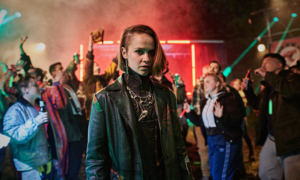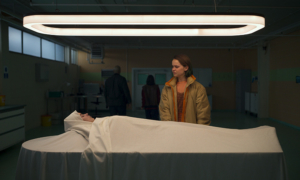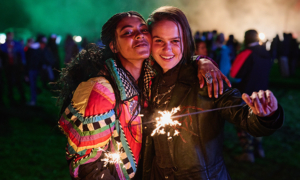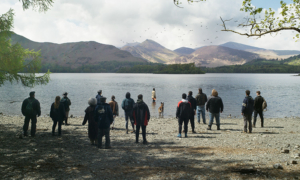A supernatural series with more than a few twists and a lot of heart, The Rising is centered on Neve Kelly (Clara Rugaard), who finds herself in the local lake after a big party to celebrate a motocross race. It comes as no surprise that she can’t remember how she’s got there. But this isn’t your average afterparty hangover, Neve has been murdered and it’s down to her to find her killer.
Coming to terms with her afterlife, Neve finds that certain people can see her, including her father (Matthew McNulty) and new acquaintance and love interest Alex (Nenda Neururer). But why can only they see her?
Soon, everything Neve thought about her life gets turned upside down as her investigation into her small home town turns towards her own friends and family. Why is her boyfriend (Solly McLeod) suddenly hiding his tracks? And what’s that strange noise she keeps hearing when things get too much?
With a slew of genre shows behind him, The Rising’s series writer Pete McTighe certainly knows his way around the supernatural. We spoke to him about the show’s core elements, Doctor Who and why he wants to write more stories set in this world…
What can you tell us about The Rising?
For me, it’s an emotional roller coaster of a show. The show starts with a young woman named Neve Kelly waking up in the middle of a lake, unsure of why or how she’s there. Then shortly after that, she realises that she’s died, that she’s been murdered, but is somehow still here in some kind of strange limbo where no one else can see her.
That’s where her quest begins, to understand what’s happened to her, why it’s happened and who’s responsible. [But] for me, the really important thing about the show is that it’s giving voice to a character who traditionally would just be a body on a slab, a MacGuffin for someone else’s story, for the police officer or whatever. This is about putting a victim of a terrible crime front and centre in her own show and giving them agency that they wouldn’t normally have in a traditional crime show. That’s the beauty of being able to blend crime and genre I think.
How would you describe the tone of The Rising? What genre does the show fit in?
I would call it a supernatural thriller. Because primarily writing it I was really influenced by some of my favourite genres shows like Twin Peaks or Les Revenants, The Returned and Dark. But it’s actually so much more than that. There’s an investigation element, obviously, a whodunnit that gives us a lot of momentum across the series, and there’s also a really strong romance story that develops from Episode Two into an emotional spine for the rest of the series. So it’s got those three important elements in it.
It’s characterful, it’s scary at times – it’s all of my favourite things in one big melting pot. Sadly, there are no Daleks or Stormtroopers, but you can’t have everything!

Neve is dead in the series – what are the rules of Neve’s afterlife?
Without trying to give too much away, she’s not a ‘ghost’. She can’t walk through walls or do any of that stuff. She’s bound by our physical world, primarily. But she’s operating in it on a different plane of existence. That’s how I saw it. She’s operating on a plane that she can see out of, but her friends and family can’t see into.
That was the starting point for me, then as the series progresses, we start to have fun with those rules and push them a bit and challenge them. But it was really important for me that we had a clearly defined set of rules on a show like this, that aren’t confusing but are intriguing. I promise that by the end of the series, you’re given quite clear answers to why, for example, some people can see Neve and other people can’t. There are definite reasons built into that, that you have explained by Episode Eight.
It was exciting to be able to come up with that stuff and challenging at times as well, when you just want Neve to be able to walk through a wall and do something. But also not wanting her to be able to do that, you need to make things difficult for her and that was a challenge of the show really having a protagonist who can’t physically interact and change the real world. It was a real challenge, but it was fun to do.
How would you describe Neve herself? How does she react to being dead? She’s very proactive…
Yeah, tell me about it. As I was writing it, I was like, ‘God, I wouldn’t be doing all this, I’d just be sitting in a corner sobbing!’
It’s a big journey for her really. Initially, [she’s in] denial and disbelief, because that’s the thing that I could relate to, and that’s the thing that I’d probably still be wallowing in if I was her. But that quickly turns into anger and a quest for justice.
That’s the thing that powers her through the series – really wanting to understand what happened to her. The cruelty of the series is showing this incredible young woman whose whole life was ahead of her and who was robbed of that opportunity. So it was really using the anger and the passion in her and the youth that she has, the injustice of it all to drive her through the rest of the series. All those qualities that made her so mesmerising in life are what’s driving her in death.

What characteristics did you want Neve to have?
I just wanted her to be a great role model and to make sure that she felt real and grounded because she’s going through this crazy, heightened experience.
[I wanted] to try and bring in all the elements of a young person’s life that you want to see in any show – their relationships with their friends, with their family, and a romance story, because there’s quite a big romance story for Neve that powers through the series. So it was about just making sure that we were doing justice to all the different elements of her life and we weren’t just using her as this walking MacGuffin. That she was a very real, rounded person and that was what was really important to me.
How would you describe Neve’s relationship with her family and friends? How does that change after she’s dead?
When she was alive, Neve was at a stage in her life where she was outgrowing this small town where she’d grown up, and the small-town mindset that she’d been trapped in. So she was ready for something else. She was ready to travel the world and push her boundaries and do new things. That was causing some tension in her personal relationships. It was as if Neve was straining these relationships and testing them a bit, preparing those people and herself to have to let go at some stage but she just never thought it would be like this!
She was ready to go off on a big adventure, and then this happened and it’s a completely other kind of adventure that she finds herself in. So that was a really interesting dynamic. The cruelty of it is that she was ready to go and explore the world and that’s suddenly taken away from her but it’s also the reality of so many of the awful victims that we read about in the press every day.
The show had a real level of emotion in it that it was emotionally true to what you would be going through even as that character. It would be very easy to do the schlocky version of the show where it’s all about ghosts and tricks and stuff, but for me, the key to the show was just grounding it in emotion.

The show is set in a small town – how does that reflect on Neve and her murder?
The small town element gives us a focus, I think. It gives us the ability to really drill down into Neve’s environment and the people around her. The motocross club obviously forms a bit of a hub for the show. It’s a place where young people can come together to socialise, to race, to get drunk, but it’s also traditionally a place that’s spawned a kind of toxic masculinity that has seeped into the fabric of this town.
That was a really important element for the show, acknowledging that that kind of toxicity exists in towns, big or small, and looking at those men who are caught up in it, or brave enough to reject it, as one of our characters does later.
There are a number of suspects in Neve’s murder – how do you go about pacing a ‘whodunnit’ series? How do you make sure not to give too much away too early?
It’s really tricky. It’s such a balancing act. As you’re going through, you’re always tweaking stuff, as you’re seeing things that are shot and thinking ‘oh God is that giving too much away’ and you’re always pushing and pulling at the script to make sure that there’s that balance there.
The whodunit is obviously really crucial to the show, but my main objective in writing this was that I wanted to deliver an emotionally satisfying ending. So it was about working that out really, and then working backward from that. As long as you know your ending, I think you can tweak the little things down the track that you’re worried about giving slightly too much away or whatever. It’s just about making sure that by the time you get to the ending, it feels emotionally satisfying.

You’ve written for newly-created series like The Rising and established franchises like Doctor Who – do you have a preference?
I like a mixture really, I’m very lucky to be in this position because I love creating my own worlds and characters, whether it’s things like The Pact, or The Rising or Wentworth [Prison], but I also really enjoy playing with other people’s toys. Toys that I love. And Doctor Who and Star Wars are my two great loves really; they’re the toys that I’ll always come and play with given the opportunity!
Supernatural and sci-fi shows are my big love. So those kinds of projects are the ones that I’m most interested in focusing on in the future. It’s because of brands like Doctor Who and Star Wars that I’m a writer in the first place. They’re the things that fired my imagination when I was a kid and started me writing. I was making up my own Doctor Who stories when I was five or six. That’s when I started writing. I would write my own Doctor Who stories and I would film little plays with my Star Wars toys (which I still have in my office!). So it’s a bit of a mixture really. Maybe that makes me greedy, but I like both!
What is it about genre that appeals to you?
I guess it’s different for everyone but for me, I think Doctor Who and Star Wars came along at a time in my life when I needed some escapism when I was a kid, and they provided that escapism. They provided the opportunity to live in my imagination for a while, which is what I did. I think because of that I have a really strong emotional attachment to them and they really helped me at a really crucial time in my life.
From that moment, from younger than 10, I was just obsessed with them. I love lots of different types of shows but supernatural and sci-fi are always my favourites. When it’s done well I love watching a show that has really good world-building and it just takes you somewhere else.
What do you want for audiences to take away from the series?
I just hope that people fall in love with Neve, and these characters, and that they enjoy the ride. That’s it really and if they like it, I hope we’ll be able to tell more stories in this universe because I’ve got lots of ideas for the future. So fingers crossed!
The Rising comes to Sky Max 22 April, with all episodes streaming on NOW.
